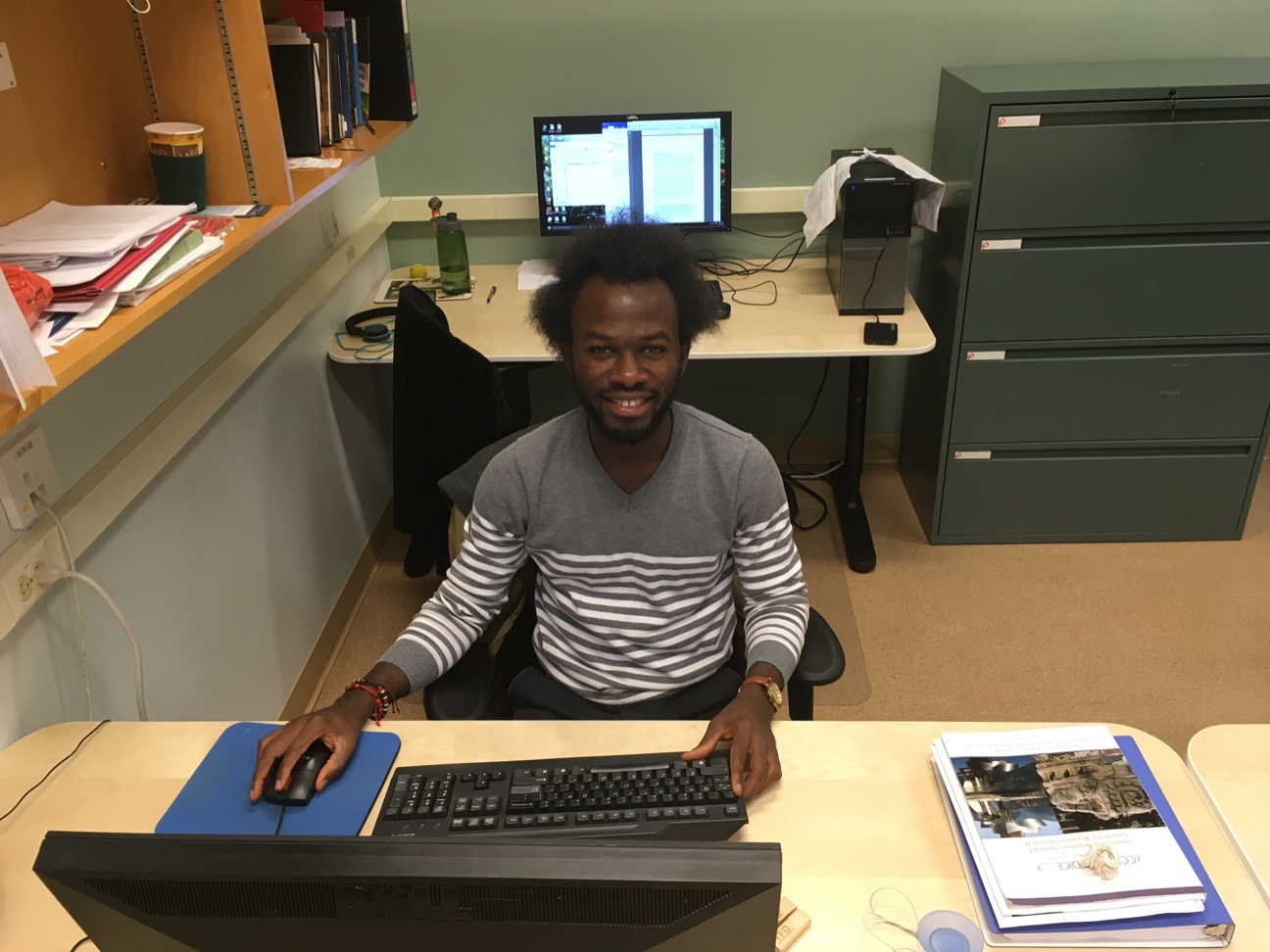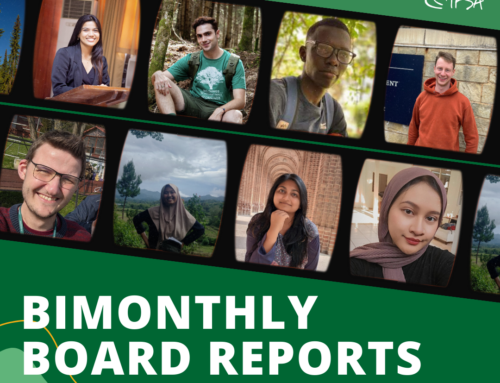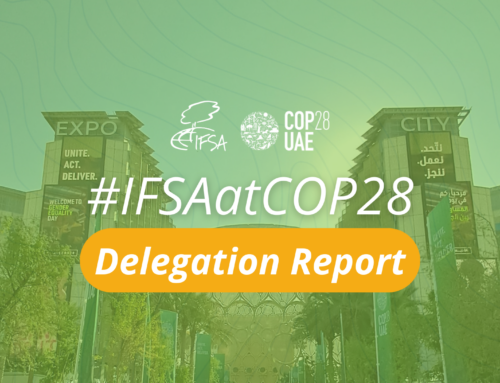Samuel Adeyanju & Babatunde Ademujimi
 (picture by Yemi Adeyeye)
Yemi Adeyeye is a Liu Scholar at the Liu Institute for Global Issues, a UBC Public Scholar and a PhD Candidate at the Faculty of Forestry, University of British Columbia, Canada. His research interests, as evident from his previous and present research pursuits form a cluster under international forest politics. His research focus aims at advancing ways by which multiple actors at different scales could engage in the development and management of carbon-based environmental interventions. His research history brings to light identities, forms and challenges around the multiplicity of interests and knowledge systems, all which have their place in resource management. Yemi did research in Nigeria, Uganda, Nepal and currently in Bolivia.
You were the Youth Liaison officer for the World Forestry Congress in South Africa in 2015. What were your roles and achievements?
Yes, it was an exciting role. As the liaison officer, the role involved communications, partnership development, event organization and advisory; considering that the WFC is a global science-policy relevant event. I also worked on organizing events around the frame of emerging policy issues and how these intersect with youth development and interests beyond the span of the forest sector. For the achievements, I will use the pronoun ‘our’ achievements, because I had a group of youth representatives, which formed the committee that worked on the ‘youth affairs’ for the congress. It was the group efforts that made the role a successful one. We had a broad representation of youth beyond the forest sector at the Congress, that were concretely involved in the congress processes.
You had your foundational education in forestry in a Nigerian University. What are the challenges facing forestry education in Nigeria, how does these affect students and their careers, and suggest possible solutions?
The Nigeria forestry education system laid the foundation for whatever I know now. And at least from my experience, Nigeria is not doing badly at it. However, Nigeria has very obvious challenges. The curriculum is our strength. It is deep, broad and rich providing coverage of ‘everything’ and helps to recognize ones interests in forestry. One factor that downplays the Nigeria forestry education is quality of teaching which is inadvertently influenced by resources availability. I attended FUTA which likely has the best forestry department in the country. However, I will like to highlight some of the challenges facing the Nigerian forestry education.
First, curriculum review is needed. Multiple specializations could be drawn out of the present forestry curriculum. The combination of first and second year in Nigeria often looks like re-living high school and dwelling in other people’s tent. Nigeria could use more of specialists than generalists. Furthermore, budget for education is general low, and forestry education is not even high on the priority list of the meager funding that institutions have to work with. In addition, the institution and industry collaborations are not working strategies in Nigeria. The attempt by Industrial training/SIWES is far from being successful in creating career readiness. These processes needs to be revamped and universities should start seeing strength in working together in this area. Though the issue of mobility is not directly within the control of universities, but this should be an important discussion point regarding producing 21st century-worthy graduates.
Having studied in Africa, Europe and now in North America. How is forestry education like for you in those different countries and cultural contexts?
As for forestry education in Europe and America, educational mobility is an advantage in Europe. This enriches overall study experiences with other add-ons like languages and multicultural awareness. As a result, there are many forms of cooperation between institutions to produce graduates with richer learning experiences than anywhere else. On another hand, forestry graduate study in North America appears to be the most thorough. North America has great focus on producing independent researchers who are capable of rigorous studies and this reflects in the curriculum design and study timelines. There are more resources in these other world – Europe and North America, and this translates into more advanced research and better educational resources. The collaboration within institutions and the organization/industry-institution linkages, that exist in Europe (I feel they lead in this area) and North America result in graduates who are more ‘work-place’ ready than their counterparts. However, I should mention that I have met more students, who know less about closely related fields in Europe and North America than products of Nigeria forestry education system.
What helped you personally to study abroad? How has IFSA helped you achieve your goals?
Hard-work first comes to mind – the realization that there is still so much to learn, and the tangibles and intangibles of this are hidden in far-reaching world corners and that I don’t have the resources to acquire such learning without support. I needed to be an investment-worthy scholar, promising for whoever has the resources and willing to train my likes.
Apart from hard work which is important for reaching one’s goal, I engage in productive hobbies. In the sense that I often try directing what I like to do for fun, into productive use. I have a very curious mind and always want to know: how things work in the real life (beyond the book covers), how others live their lives, what do we have in common and how do we differ. These are thoughts that underpin why I study in different places and do the kind of research I do. This also makes me volunteer for different causes. Volunteering for IFSA in different roles was very helpful in so many ways. IFSA provides a platform where one can garner multi-cultural understanding, exposure to emerging issues in the forest sector, interaction with organizations and institutions around the world, friendship everywhere and leadership skills and many more. Being a part of IFSA gives the opportunity to work with other interesting and brilliant youth from different part of the world. I am glad to see IFSA evolve over the years and even more so, as IFSA still offers me the opportunity to get involve (presently as a consulting member).
What is your advice to the government, educational institutions, researchers, teachers and other stakeholders involved in forestry education in Nigeria?
It should be noted that many individuals within these stakeholder categories have a great deal of exposure. My first advice is for individuals like this to remember the experiences their exposures offered them. Such individual should engage in translating the experiences into practice. Debates and discussions about the challenges in forestry education are not forthcoming or the issues are just relegated by many other prevailing national issues.
The thoughts in this interview and many more like it should be taken into consideration by these stakeholders. As far as the current policy goes, forestry and consequently forestry education is not an important agenda in our national discuss. Just like stakeholders in the oil and gas, health, security and many more topics are raising issues in the national agenda, stakeholders in forestry education have been silent for too long, It is the responsibility of these stakeholders to take forestry education to the fore-front of national discuss. More importantly, an increase in educational budget and re-orientation about the importance of the sector is paramount.
Further links:
Full introduction of Yemi Adeyeye: http://liu.arts.ubc.ca/profile/yemi-adeyeye/
WFC 2015: http://www.fao.org/about/meetings/world-forestry-congress/get-involved/youth/en/ ; https://forests2015.wordpress.com/2015/04/28/youth-involved-forests2015/ ; http://www.fao.org/about/meetings/world-forestry-congress/outcome/en/
For questions or feedback please contact adeyanjusamuel2014(a)yahoo.com]]>
(picture by Yemi Adeyeye)
Yemi Adeyeye is a Liu Scholar at the Liu Institute for Global Issues, a UBC Public Scholar and a PhD Candidate at the Faculty of Forestry, University of British Columbia, Canada. His research interests, as evident from his previous and present research pursuits form a cluster under international forest politics. His research focus aims at advancing ways by which multiple actors at different scales could engage in the development and management of carbon-based environmental interventions. His research history brings to light identities, forms and challenges around the multiplicity of interests and knowledge systems, all which have their place in resource management. Yemi did research in Nigeria, Uganda, Nepal and currently in Bolivia.
You were the Youth Liaison officer for the World Forestry Congress in South Africa in 2015. What were your roles and achievements?
Yes, it was an exciting role. As the liaison officer, the role involved communications, partnership development, event organization and advisory; considering that the WFC is a global science-policy relevant event. I also worked on organizing events around the frame of emerging policy issues and how these intersect with youth development and interests beyond the span of the forest sector. For the achievements, I will use the pronoun ‘our’ achievements, because I had a group of youth representatives, which formed the committee that worked on the ‘youth affairs’ for the congress. It was the group efforts that made the role a successful one. We had a broad representation of youth beyond the forest sector at the Congress, that were concretely involved in the congress processes.
You had your foundational education in forestry in a Nigerian University. What are the challenges facing forestry education in Nigeria, how does these affect students and their careers, and suggest possible solutions?
The Nigeria forestry education system laid the foundation for whatever I know now. And at least from my experience, Nigeria is not doing badly at it. However, Nigeria has very obvious challenges. The curriculum is our strength. It is deep, broad and rich providing coverage of ‘everything’ and helps to recognize ones interests in forestry. One factor that downplays the Nigeria forestry education is quality of teaching which is inadvertently influenced by resources availability. I attended FUTA which likely has the best forestry department in the country. However, I will like to highlight some of the challenges facing the Nigerian forestry education.
First, curriculum review is needed. Multiple specializations could be drawn out of the present forestry curriculum. The combination of first and second year in Nigeria often looks like re-living high school and dwelling in other people’s tent. Nigeria could use more of specialists than generalists. Furthermore, budget for education is general low, and forestry education is not even high on the priority list of the meager funding that institutions have to work with. In addition, the institution and industry collaborations are not working strategies in Nigeria. The attempt by Industrial training/SIWES is far from being successful in creating career readiness. These processes needs to be revamped and universities should start seeing strength in working together in this area. Though the issue of mobility is not directly within the control of universities, but this should be an important discussion point regarding producing 21st century-worthy graduates.
Having studied in Africa, Europe and now in North America. How is forestry education like for you in those different countries and cultural contexts?
As for forestry education in Europe and America, educational mobility is an advantage in Europe. This enriches overall study experiences with other add-ons like languages and multicultural awareness. As a result, there are many forms of cooperation between institutions to produce graduates with richer learning experiences than anywhere else. On another hand, forestry graduate study in North America appears to be the most thorough. North America has great focus on producing independent researchers who are capable of rigorous studies and this reflects in the curriculum design and study timelines. There are more resources in these other world – Europe and North America, and this translates into more advanced research and better educational resources. The collaboration within institutions and the organization/industry-institution linkages, that exist in Europe (I feel they lead in this area) and North America result in graduates who are more ‘work-place’ ready than their counterparts. However, I should mention that I have met more students, who know less about closely related fields in Europe and North America than products of Nigeria forestry education system.
What helped you personally to study abroad? How has IFSA helped you achieve your goals?
Hard-work first comes to mind – the realization that there is still so much to learn, and the tangibles and intangibles of this are hidden in far-reaching world corners and that I don’t have the resources to acquire such learning without support. I needed to be an investment-worthy scholar, promising for whoever has the resources and willing to train my likes.
Apart from hard work which is important for reaching one’s goal, I engage in productive hobbies. In the sense that I often try directing what I like to do for fun, into productive use. I have a very curious mind and always want to know: how things work in the real life (beyond the book covers), how others live their lives, what do we have in common and how do we differ. These are thoughts that underpin why I study in different places and do the kind of research I do. This also makes me volunteer for different causes. Volunteering for IFSA in different roles was very helpful in so many ways. IFSA provides a platform where one can garner multi-cultural understanding, exposure to emerging issues in the forest sector, interaction with organizations and institutions around the world, friendship everywhere and leadership skills and many more. Being a part of IFSA gives the opportunity to work with other interesting and brilliant youth from different part of the world. I am glad to see IFSA evolve over the years and even more so, as IFSA still offers me the opportunity to get involve (presently as a consulting member).
What is your advice to the government, educational institutions, researchers, teachers and other stakeholders involved in forestry education in Nigeria?
It should be noted that many individuals within these stakeholder categories have a great deal of exposure. My first advice is for individuals like this to remember the experiences their exposures offered them. Such individual should engage in translating the experiences into practice. Debates and discussions about the challenges in forestry education are not forthcoming or the issues are just relegated by many other prevailing national issues.
The thoughts in this interview and many more like it should be taken into consideration by these stakeholders. As far as the current policy goes, forestry and consequently forestry education is not an important agenda in our national discuss. Just like stakeholders in the oil and gas, health, security and many more topics are raising issues in the national agenda, stakeholders in forestry education have been silent for too long, It is the responsibility of these stakeholders to take forestry education to the fore-front of national discuss. More importantly, an increase in educational budget and re-orientation about the importance of the sector is paramount.
Further links:
Full introduction of Yemi Adeyeye: http://liu.arts.ubc.ca/profile/yemi-adeyeye/
WFC 2015: http://www.fao.org/about/meetings/world-forestry-congress/get-involved/youth/en/ ; https://forests2015.wordpress.com/2015/04/28/youth-involved-forests2015/ ; http://www.fao.org/about/meetings/world-forestry-congress/outcome/en/
For questions or feedback please contact adeyanjusamuel2014(a)yahoo.com]]>




